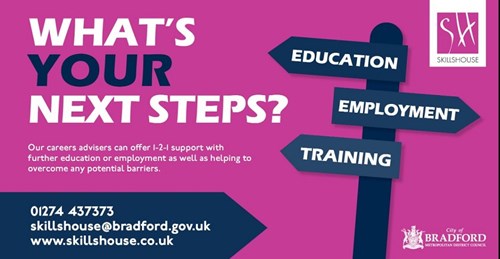We will be doing maintenance to our website systems on Friday, 26 and Sunday, 28 April. more »

GCSE Results Day 2023
Your results, what next?
On this page you will find information on where to get advice and guidance on what to do next, whether you received the grades you wanted or not.
Young people in England can leave school in the summer that they are 16. Then, until the age of 18 they must either:
- stay in full-time education, for example at a college or school
- start an apprenticeship or traineeship
- spend 20 hours or more a week working or volunteering, while in part-time education or training
Study full time
There are a range of options for A levels and technical qualifications that can open up exciting careers pathways. You can study:
- Subjects: A levels and other subject-based qualifications like International Baccalaureate (IB) and Cambridge Pre-U. These are good if there are subjects you like and want to study further, or if you are planning to go to university. You normally need a minimum of 5 GCSEs at grade 4-9 to do A-Levels including maths and English. However, entry requirements will vary between different sixth forms and colleges.
- Work and job-related courses: NVQs, BTECs, TechBacs and Cambridge Technicals are good qualifications to take if you want to combine hands on, practical learning with studying subjects and technical skills. They are specialist courses which relate to particular jobs, sectors, or subject areas. Depending on what qualifications you take, you can go on to further education, training, or employment, or you can go to university.
Bradford College, Keighley College and Shipley College, for instance, provide such courses in a range of specialisms.
Apprenticeships, traineeships and supported internships
You can also choose to train while you work by taking on an apprenticeship, traineeship or supported internship.
- Apprenticeship: For anyone age 16 or over, you work for an employer and train to do a specific job at the same time while earning at least minimum wage. There are over 280 types of apprenticeship for over 1,500 job roles. See below for more details.
- Traineeship: Gets you ready for work or for doing an apprenticeship. They last from six weeks to six months and provide essential work preparation training, literacy and numeracy skills and work experience to get an apprenticeship or other job.
- Supported internship: Just for students with learning difficulties or learning disabilities who want to get a job and need extra support to do this. They last for at least six months and are unpaid. You get work experience and an employer trains you to do a job role. You also get to study for qualifications or other courses to help you get ready to take up a job.
More on apprenticeships - earn while you learn
Apprenticeships are a popular alternative career pathway that allow you to learn, earn and get hands-on experience at the same time. You can progress up to degree level on many apprenticeship routes.
Apprentices can:
- Get a real job and continue their education up to degree level.
- Earn a competitive salary while all their training is paid for.
- Gain hands-on experience and learn skills that employers want, helping shape their future career.
- Choose from thousands of vacancies in a range of industries, from engineering to nursing, and law to design.
Information and a multitude of opportunities can be found both locally and nationally:
- General information from the Government
- Bradford Council's apprenticeship information
- Search for apprenticeships in Bradford and District
- Search for apprenticeships nationally
It's also a good idea to search social media using the following hashtags:
Further advice

If you need advice and guidance on your next steps contact SkillsHouse the Council's free and confidential education and careers support service for young people. Call them on 01274 437373 or contact them through their website.
Or, pop along to their free Next Steps event and speak to careers advisers in person.
The event is on Friday 25 August in The Broadway shopping centre in Bradford from 12pm to 3.30pm.
There are lots of other services that also offer advice and guidance on your next steps:
- Career Pilot has lots of advice on what you can do next.
- National Careers Service - lots to help you make decisions on your ideal job:
- a library of job profiles
- skills health check
- Advice on how to look for and apply for jobs, including CV writing and interview tips
- Bradford Council’s Skills for Work delivers employment and skills training support for young people facing the most barriers to employment.
Support with stress and mental health
Exam result time can be a stressful for young people and their families. There is advice and support online at Childline and Young Minds, and your GP or school nurse can also offer advice and support. There is additional support and advice at the following links.

